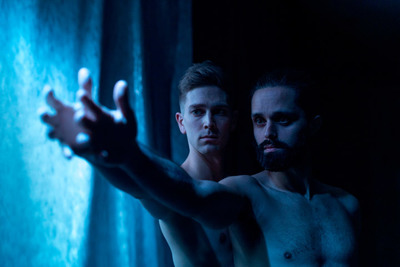FringeReview Ireland 2019

Like Orpheus
Written by: Brett Dahl, Staged by: Jay Whitehead, Jordan Payne, Brett Dahl and Kevin Jesuino

Genre: Dance and Movement Theatre, LGBT, LGBT Theatre, LGBTQ, Poetry-Based Theatre
Venue: The Teachers Club
Festival: FringeReview Ireland
Low Down
Like Orpheus explores queer club culture through brash poetic moments and gripping/groping movements. Like an extended soliloquy, we float through scenes of passion and assault. Their needs and numbness entwine, punctuated by the voyeuristic. Like Orpheus explores the taboo of love and lust pulsing in the margins.
Review
Like Orpheus is a surreal nightmare blending violent poetic friction with pulsing clubby eroticism, a strange yet fascinating pairing – like a horror story on ice. The movement is outstanding – Striking and original with a frantic, grasping, athleticism. The piece opens with a desperate duet. The green-tinged lights turn sweet fruit vile like a macabre cabaret. The atmosphere calls to mind “Slow Disco” by St. Vincent – the characters/symbols/dancers (are we human or are we dancer?) are alone within a club. They are alone amongst a crowd – surrounded by strangers. This vulnerability foreshadows the darker tones that bleed into the slightly camp, rave ridden assemblage.
Dance, poetry and lighting are the stars of the show. The dialogue, mostly made up of poetic monologues, lends an unanchored quality – it’s hard to say what time it is or where we are. Time jumps contribute to this sense of being carried from one memory to the next. We are wrapped and rolled in words meant to evoke rather than prescribe the love/trauma/fear of it all. The horrors of assault and the longing for love, identity and experience, the sacrilege and reverence of bodies – this show is a duet of contradictions.
At times certain sections seemed too long. The order of the show felt jumbled and hard to follow. While some may enjoy letting go of fully understanding the narrative, others might feel frustrated by this structure. At first it’s pleasing but as the timing and aesthetic of the performance wears on, some scenes may fold in and resemble each other less like a rhyme and more like a copy. In an environment that hinges on potent imagery, repetition may not be a welcome bedfellow.
Both men are clearly highly skilled dancers. The directors seem keenly aware of the effect of well-muscled men in small black bike shorts. The costumes function as a double entendre. Within the world of classical and contemporary dance these costumes would be acceptable and even commonplace, ne’re an eyebrow raised. In a club, these would be tongue and cheek “peachy” fun. The two functions of the same outfit both bold and exposed, of two worlds both alike in dignity, do well to simply and pointedly enunciate the ways in which queer expression is marginalized. That being said, no amount of analysis can excuse a non-existent set and a costume that other than a few dazzling pieces are as common a cop-out as they come.
While the set may be lacking the lights are smartly implemented. Flashlights are used to further implicate the audience into an almost violent voyeurism (warning this show contains nudity). Far too often nudity is used for a cheap shock value or is completely unearned within the context of a show. However, the use of nudity to punctuate the vulnerability and voyeuristic aspect of the show was thoughtful and well paced.
While these men were certainly cast for their dancing ability, their lacking when it comes to speaking the text. The words themselves are mellifluous with a tenuous grip on sanity, yet the actors veered between melodrama and deadpan. While at times achieving a truly visceral authenticity especially at the show carried on, it was a gruelling experience to watch them slough through words like hacking a tree – wooden and stiff. Further investigation of fluctuation in pitch, genuine grounding in expression as well as significant investigation into each word’s importance and implications would have greatly improved what was otherwise a stellar show.
This show was a stunning one of a kind performance. It’s well crafted, thoughtful and unique – well worth seeing. Come for the dance, stay for the words and treat acting like a nice afterthought. However, it’s not only about craft but content and this content matters. We need representation for queer theatre – exploring diverse and personal narratives. This abstract and symbolic approach to the exploration of trauma, loneliness and love was clearly much needed by the audience and theatre that is needed is such an incredible gift.


















































